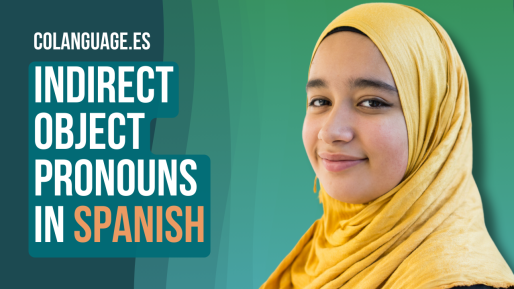Reflexive pronouns in Spanish (myself, yourself, themselves) Share Copied!
Spanish
This lesson covers the reflexive pronouns and how to use them with reflexive verbs. We have an individual lesson on reflexive verbs as well.
Video
Podcast
What are reflexive pronouns?
Reflexive pronouns are like a mirror in a sentence. They reflect the action back onto the subject.
- Me cepillé los dientes yo solo. (I brushed my teeth all by myself.)
- Él se vistió por la mañana. (He dressed himself in the morning.)
- Ellos se culparon a sí mismos por el malentendido. (They blamed themselves for the misunderstanding.)
Reflexive pronouns in Spanish
In Spanish, it's common to omit the personal pronouns when using reflexive verbs because the conjugation of the verb already implies the subject.
| Reflexive pronouns | Spanish | English |
|---|---|---|
| Me (Myself) | Me cepillo. | I brush myself. |
| Te (Yourself) | Puedes ducharte. | You can shower (yourself). |
| Se (Himself/Herself) | Ella se lava. | She washes herself. |
| Nos (Ourselves) | Nos organizamos. | We organise ourselves. |
| Os (Yourselves) | Deberíais expresaros. | You should express yourselves. |
| Se (Themselves) | Ellos se visten. | They dress themselves. |
In Spanish, reflexive pronouns are often added to the end of verbs when the verb is in the infinitive form or used as a gerund.
Puedes ducharte. (You can shower.)infinitive
Estaba duchándome. (I was showering.)gerund
Reflexive and reflexive verbs in Spanish
Reflexive pronouns are closely linked to reflexive verbs in Spanish. These verbs indicate that the subject is performing an action on themselves, such as daily routines or personal care activities.
| Reflexive verb | Spanish | English |
|---|---|---|
| Levantarse (to get up) |
Yo me levanto. | I get up. |
| Lavarse (to wash oneself) |
Tú te lavas. | You wash yourself. |
| Peinarse (to comb one's hair) |
Él se peina. | He combs his hair. |
| Vestirse (to dress oneself) |
Nosotros nos vestimos. | We dress ourselves. |
| Acostarse (to go to bed) |
Vosotros os acostáis. | You go to bed. |
| Ducharse (to shower) |
Ellos se duchan. | They shower. |
Note that the reflexive pronoun in the third person in singular and plural forms are the exact same.
Él se peina. (He combs his hair.) él/ella (he/she)
Ellos se peinan. (They comb their hair.)ellos/-as (them)
Listening exercise
In the following exercise, we will put into practise some of the most common reflexive verbs in Spanish.
| Spanish | English | |
|---|---|---|
| Daniel |
¿Te levantaste temprano hoy? |
Did you get up early today? |
| María |
Sí, me levanté a las seis de la mañana. ¿Y tú? |
Yes, I got up at six in the morning. And you? |
| Daniel |
No, me desperté tarde. ¿Nos vemos esta tarde? |
No, I woke up late. Shall we see each other this afternoon? |
| María |
Claro, nos vemos en unas horas. |
Of course, see you in a few hours. |
Key takeaways
Here is a quick summary of this lesson.
- Reflexive pronouns in Spanish reflect the action back onto the subject, indicating self-action like "Me cepillé los dientes" (I brushed my teeth).
- Personal pronouns can be omitted with reflexive verbs because the verb conjugation implies the subject, as seen in "Me cepillo" (I brush myself).
- Reflexive pronouns are closely tied to reflexive verbs, indicating actions performed on oneself, common in daily routines or personal care activities like "Lavarse" (to wash oneself).
Subscribe to our social media channels to get free daily exercises!



